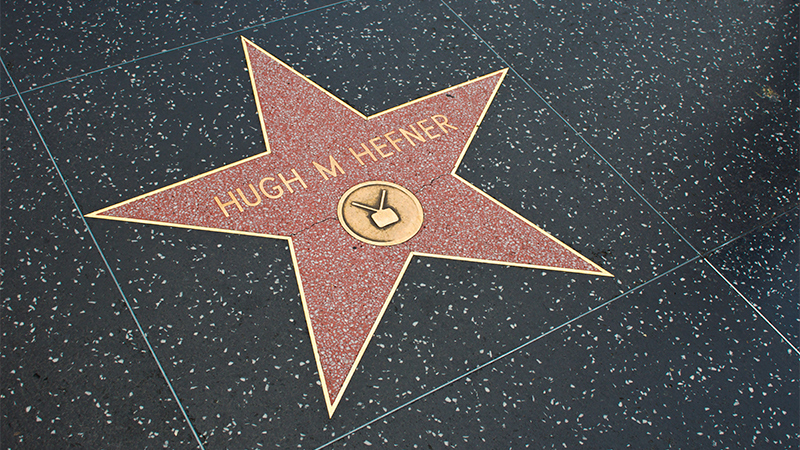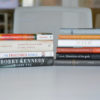Recently I was moving some books around on the shelf, and was drawn into reading around in a book I hadn’t read in many years. I was noticing my highlights, now faded on the page, and remembering what in my life had brought such things to mind. I put the book back on the shelf and thanked God for using the book the way he did in my life–to change me, in ways I know about and, I’m sure, in some ways that I don’t. This caused me to jot down a thought experiment of seven books that have changed my life.
Note, these are not (necessarily) the best books I’ve ever read. They are books that came around at just the right time to change things for me. In this list, I’ve excluded older works and classics; I’ll deal with them in another list. These are all post-World War II works. I’ve also excluded fiction and poetry, and will deal with them in another list as well.
1) C.S. Lewis, Mere Christianity.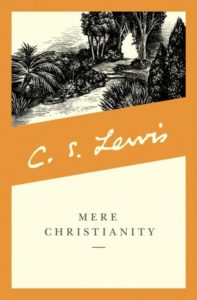
This book probably, by God’s grace, saved my faith. At age fifteen, I moved into a time of profound depression. Some of that was due to disillusionment with Christianity. I saw a cultural Christianity all around me that was often cynical, manipulative, racist, and filled with rage. I wondered if the gospel was just another prop for southern culture or mere power politics. If so, I wanted out.
I came across a copy of this book in the mall bookshop, and flipped through it, but didn’t buy it immediately. I recognized the author’s name from the Narnia books of my childhood. I asked an older friend with a driver’s license to pick up a copy for me. Lewis connected me to a larger, broader, joyful Christianity, one connected to the creedal witness of the church across two millennia. Most important of all was Lewis’s tone. He seemed to be someone who wasn’t trying to sell me anything or bully me into his viewpoint. He was bearing witness to a person, to Jesus. That made all the difference.
2) J. Gresham Machen, Christianity and Liberalism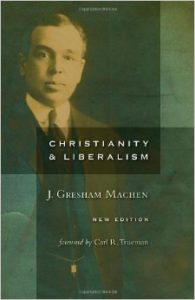
Once I made it through my teenage crisis of faith, I cast about to discover what was the problem with the often anti-intellectual Christianity around me. One older figure in my life suggested that the problem was “fundamentalism,” which he defined as biblical inerrancy and the supernaturalism of a Bible filled with miracles, a Virgin Birth, an Empty Tomb, a Second Coming, and so forth. These voices suggested that my evangelical orthodoxy was a childish phase I would eventually get over.
Machen’s little treatise demonstrated what I intuited to be the case—that theological liberalism is simply a different religion from orthodox Christianity. Moreover, Machen showed that “liberalism” isn’t just what we think of as “progressive.” It is any movement that uses Christianity as a means to an end—whether that end is “conservative” or “liberal.” Machen’s defense of the supernatural vision of the Bible gave me confidence in the gospel that I had first received., and made me wary of “Christian America” sloganeering.
But Machen’s book is also deeply personal. This line sticks with me: “The truly penitent man longs to wipe out the effects of sin, not merely to forget sin. But who can wipe out the effects of sin? Others are suffering because of our past sins; and we can attain no real peace until we suffer in their stead. We long to go back into the tangle of our life, and make right the things that are wrong—or at least to suffer where we have caused others to suffer.” I’ve found this to be true, and increasingly true over the span of my life. Where does Machen point me? He points to the cross. I need that word, over and over again.
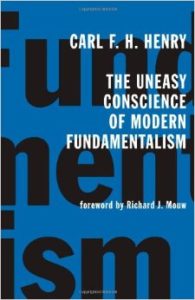 3) Carl F.H. Henry, The Uneasy Conscience of Modern Fundamentalism
3) Carl F.H. Henry, The Uneasy Conscience of Modern Fundamentalism
I grew up exhausted by the sort of dispensationalist prophecy-chart Christianity that boiled over in the 1980s. Not only was this form of sensationalism so frequently wrong about what was going on in the world (the Soviet Union turned out not to be Gog and Magog, etc.), but it seemed distant from what the Bible itself was actually about.
This little book did a number of things for me. In it, Henry showed me a vision of a whole gospel Christianity—in which neither evangelism nor social action are ignored. Even more than that, though, the book introduced me to what I intuited from the Scriptures, that the kingdom of God is simultaneously “already” and “not yet.” This led me to many other scholars who developed this theme, and my thinking here shaped the entire rest of my ministry.
4) Frederick Buechner, A Room Called Remember
I found this little book of essays in my local library, and then, within months, had read everything I could find by Buechner. Like Lewis, he seemed to be telling me the truth, with nothing to hide and nothing to sell. More than that, Buechner could portray both the vulnerability of the human psyche and the beauty of God’s grace better than anyone I had encountered to that point.
“The decisions you think are the most important turn out not to matter so much after all,” he wrote, “But whether or not you mail the letter, the way you say goodbye or decide not to say it, the afternoon you cancel everything and drive out to the beach to watch the tide come in—these are to be the moments when souls are won or lost, including quite possibly your own.”
I’ve found that to be true. This too:
“By faith we are to understand if we are to understand it at all, that the madness and lostness we see all around us and within us are not the last truth about the world but only the next to the last truth.”
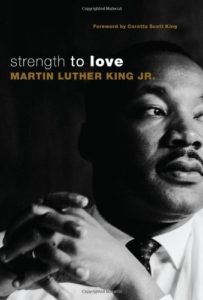 5) Martin Luther King, Jr., Strength to Love
5) Martin Luther King, Jr., Strength to Love
King noted that he was reluctant to publish these sermons, because they were, well, sermons; that is, they were meant to be heard and not read. But I’m glad he did. For me, the book helped me to see a vision of justice that spoke to the conscience and was grounded in hope. The most important aspect of this book for me was King’s chapter on the Good Samaritan. King prompted a key insight for me there, that the priest and the Levite who passed by the beaten man on the Jericho Road might well have been motivated not by apathy but by fear. The road was dangerous, after all, and the sight of a beaten man would alert them that they could be the next victims.
King’s conclusion: “The ultimate measure of a man is not where he stands in moments of comfort and convenience but where he stands at times of challenge and controversy. The true neighbor will risk his position, his prestige, and even his life for the welfare of others.”
King also helped me, in this book, to see a Baptist conception of the church’s relationship to the state. As he put it, “The church must be reminded that it is not the master or the servant of the state but rather the conscience of the state. It must be the guide and the critic of the state and never its tool.” I was transformed by that simple truth, and have tried to live up to it ever since.
6) Walker Percy, Signposts in a Strange Land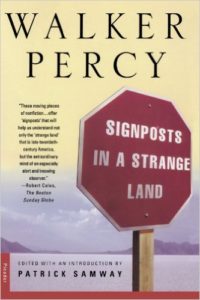
It is hard to overstate how much this book has shaped my ministry. First of all, Percy articulated what I sensed was wrong with nominal Bible Belt Christianity. It was, he argued, not Christian at all but rather Stoic. Moreover, he centered me on the responsibility of the church to bring a Christian message to racial injustice. But this book didn’t just make the case for what was wrong. I think all the time of this sentence: “Just because Jimmy Swaggart believes in God doesn’t mean that God doesn’t exist.”
But, most of all, in this book Percy taught me that the collapse of Bible Belt Christendom is not a catastrophe. “The good news is that in becoming the minority in all countries, a remnant, the Church also becomes a world church in the true sense, bound to no culture, not even to the West of the old Christendom, by no means triumphant but rather a pilgrim church witnessing to a world in travail and yet a world to which it will appear ever stranger and more outlandish.”
I think that insight, with which I immediately agreed and rejoiced, has shown up in quite literally every sermon I’ve preached, every book or article I’ve written, ever since.
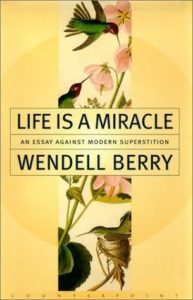 7) Wendell Berry, Life Is a Miracle: An Essay Against Modern Superstition
7) Wendell Berry, Life Is a Miracle: An Essay Against Modern Superstition
I was first drawn to Berry’s work by his fiction, but beginning during my doctoral study years in Kentucky I devoured everything he wrote. This little book shifted my thinking, and my affections, significantly. I’m honestly surprised by that, because this book would seem to be the most distant of all Berry’s works to my life. Much of it is a jeremiad against scientific materialism, which wasn’t anything I was ever particularly tempted by or drawn toward. But two key truths in this book changed my life.
The first is the necessity of affection to understand the mystery of the world. Even scientists, he noted, do not speak of their loved ones as abstract humans. “Affection requires us to break out of the abstractions, the categories, and confront the creature itself in its life in its place.” This has moral implications because, as he put it, “people exploit what they have merely concluded to be of value, but they defend what they love,” I have hated the modern jargon of “values” ever since.
Even more important for me was his point that the modern age sees humanity—and the rest of creation—through the metaphor of machines. We speak of how people are “wired,” and of what “makes us tick.” The metaphor is revealing. For Berry, the question of the age is whether we will see people as creatures or as machines. If creatures, then we embrace the goodness of limits and the mystery of reality that can’t be reduced to biology or physics. I think he is right.




